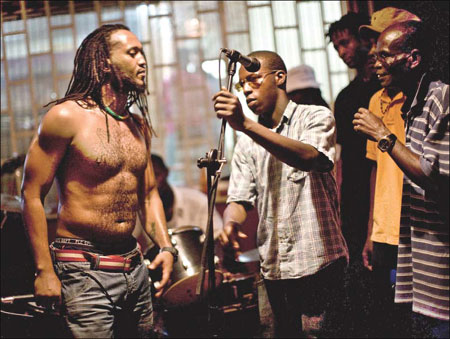Liberian rappers eye big time
Updated: 2012-02-13 08:15
By Robert Leslie (China Daily)
|
|||||||||||
|
Nasseman, a Liberian musician, performs at a restaurant in Monrovia, Liberia. Nasseman is a 'hipco' performer, a homegrown musical mash-up of hip hop. [Glenna Gordon / Agence France-Presse] |
MONROVIA, Liberia - The beat is infectious US-style hip hop but the rhymes come straight from the streets of Monrovia, a city which for years has had very little to sing about.
In a soundproof recording booth in the center of Liberia's teeming capital, sweat beads on the forehead of 30-year-old Jonathan Koffa - aka Takun J - as he spits out a stream of improvised lyrics into a microphone.
Koffa is one of the founding fathers of "hipco", a homegrown musical mash-up of hip hop and the Liberian "colloquial" English.
In a nation still reeling from years of conflict and with a high rate of illiteracy, it's a style of music that's speaking to the young people of Liberia in words they understand.
"We had just come from war and people just wanted to cancel the stress and just dance and wanted to hear something different - and we relate to one another easily with hipco" said Koffa, smoothing a narrow goatee that sits low under his chin in the style of US rapper Snoop Dog.
The on-off 14-year civil war in the West African nation left around a quarter of a million people dead - but also deprived an entire generation of an education and of a chance to engage with Liberia's music scene.
Only now, with the relatively stable government of Africa's first and only elected female head of state, President Ellen Johnson-Sirleaf, is the continent's oldest republic beginning to show its creative colors.
And with the help of new radio stations, and the limited but expanding use of mobile phones and the Internet, hipco is leading the charge.
Every inch the hip hop artist with wide-rimmed black baseball cap, baggy T-shirt and thick silver chain, Koffa recalls a time when rapping wasn't quite so easy.
His first hipco song in 2007, Policeman Coming, attacked police corruption with the lyrics: The policeman can take sides when he see money / The policeman not fair, policeman not right / Policeman judge your case, brother you'll be scared...
"People understood what I was saying in the song - every five minutes they (police) beat me and chased me and sent me to jail."
The music bridges the gap between the much-admired symbols of US culture and young Liberians for whom the bling, cars and cash seen in hip hop videos is as foreign as the bright lights of downtown Manhattan.
Liberia was founded in 1847 by freed US and Caribbean slaves and the links remain strong - not least in the red and white stripes of the national flag.
"People tried to do their music like the Americans but we're not American so we came out with this hipco stuff which is our own way of talking to Liberian people," Koffa said.
"I'm from the streets and I write about the people who have been neglected and rejected, who feel they cannot make it in society and so that's why we write these songs."
Koffa no longer gets locked up for the lyrics he writes and recent songs like Six Jue and Who Make You Cry talk more about relationships than running from the police.
But while he dreams of fame, wealth remains out of reach.
In a country of mass unemployment and with more than 60 percent living below the poverty line, few can afford to buy music on tape or CD.
"We are just young people trying to build a career in this industry but there is no money in it," said 33-year-old Hazem Harb, co-owner of the HOTT FM radio station, and part-time promoter for Takun J and other hipco artists.
Harb made 10,000 copies of his first hipco compilation CD, giving most of them away.
"We're still trying to figure out how to make money out of this music - now we're just getting the buzz out there, we're not concerned about money. But I will tell you that if you come here after one maybe two years or even where you come from, you will hear the music from right here in Liberia."
Agence France-Presse
Today's Top News
President Xi confident in recovery from quake
H7N9 update: 104 cases, 21 deaths
Telecom workers restore links
Coal mine blast kills 18 in Jilin
Intl scholarship puts China on the map
More bird flu patients discharged
Gold loses sheen, but still a safe bet
US 'turns blind eye to human rights'
Hot Topics
Lunar probe , China growth forecasts, Emission rules get tougher, China seen through 'colored lens', International board,
Editor's Picks

|

|

|

|

|

|






